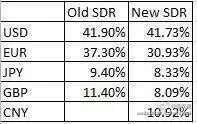amoy
Senior Member
- Joined
- Jan 17, 2010
- Messages
- 5,982
- Likes
- 1,849
IMF says to study RMB's international use for next SDR basket review later this year


Renminbi enters Americas' tradings system as payment currency this week via CanadaWASHINGTON, March 12 (Xinhua) -- The board of International Monetary Fund (IMF) will reexamine the international use of yuan or Renminbi (RMB), the Chinese currency, when it reviews the currencies in the basket of the Special Drawing Rights (SDRs) later this year, the organization's spokesman Gerry Rice said Thursday.
Since the last review in 2010, "there have been a number of developments regarding the RMB's international use, and .. the upcoming review will take stock of these developments," Rice told reporters at a regular briefing. "That's something going to be happening toward the end of this year as I said."
Rice added that the IMF board essentially reviews currencies in the SDR basket every five years, with the next review to be scheduled for later this year, and the updates of the SDR basket will become effective in January 2016.
SDRs are international foreign exchange reserve assets. Allocated to nations by the IMF, an SDR represents a claim to foreign currencies for which it may be exchanged in times of need.
Although denominated in U.S. dollars, the nominal value of an SDR is derived from a basket of currencies, with a fixed amount of Japanese yen, U.S. dollars, British pounds and euros.
Rice noted that the selections of currencies for the SDR basket are based on two criteria -- the size of the country's exports and whether its currency is freely useable. In the IMF's last review in 2010, "the RMB met the export criteria, but was assessed to not meet the freely useable criteria," said the IMF spokesman.
Rice's remarks came hours after a senior Chinese central bank official said that the country is "actively communicating" with the IMF on the possibility of including RMB into the SDR basket.
"We hope the IMF can fully take into account the progress of RMB internationalization, to include RMB into the basket underlining the SDR in foreseeable, near future," said Yi Gang, vice governor of the People's Bank of China, in Beijing Thursday.
However, China will be patient until conditions are ripe, Yi said at a press conference on the sidelines of the country's ongoing annual parliamentary sessions held in the national capital, adding that views are divided on whether the RMB is a freely usable currency.
"No matter whether and when the RMB will be included in the SDR basket, China will push on with its financial sector reform and opening-up," Yi said.
The RMB became the world's No. 2 currency for trade finance globally in 2013, and overtook the Canadian and Australian dollars to enter the top five world payment currencies last year, according to global transaction services organization SWIFT.
RMB has also been used as a reserve currency in some other countries outside China and regions.
STARTING this week, the renminbi (RMB) will step into Canada with the inauguration of the only RMB hub in the Americas, one more advance on its long march to internationalisation, writes Peter Hall, vice president and chief economist of Export Development Canada.
On the opportunities front, the benefits are equally apparent. By adopting the RMB as a payments currency, Canadian traders will have access to a wider universe of Chinese clients, and at the same time, improve their bottom lines.
This is because the vast majority of China's traders are SMEs, most of which do not have US dollar liquidity. As such, they need to rely on foreign exchange agents to access dollars, who in turn charge service fees and impose conversion ceilings. This creates bottlenecks and costs.
However, if payment was made in RMB, life would become a whole lot easier and cheaper for everyone involved - except, of course, the foreign exchange agent.
Finally, timing is also important, especially for our exporters. The RMB is expected to continue its fall against the US dollar during 2015. China's importers will be more receptive than ever to denomination of contracts in RMB.
It all began, with its first step into Hong Kong more than a decade ago. A long pause, and then a move into southeast Asia in 2013. Then Europe in 2014. In each of these locations, the RMB's arrival was both eagerly anticipated and ballyhooed.
We know in Canada it will be greeted with fanfare, but what is less certain is whether or not Canadian exporters and international investors will take action once the celebration ends. Should they?
It sure seems so. Consider the marvel of the RMB's rise. Simply put, we are watching history in the making. Within the span of the last five years, the RMB went from being virtually non-existent outside the People's Republic to the fifth most used payments currency in the world as of last autumn. And there is little doubt that before long it will overtake the Japanese yen and be fast on the heels of the pound.





